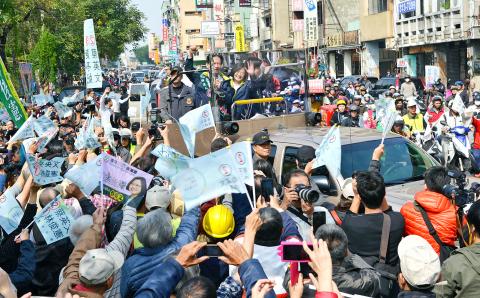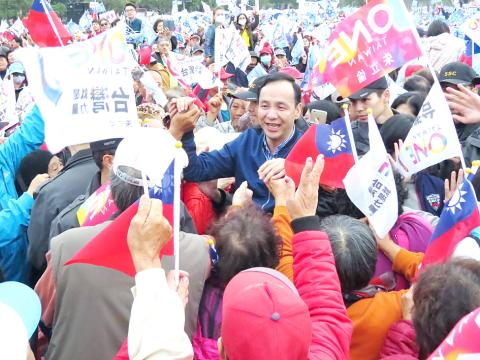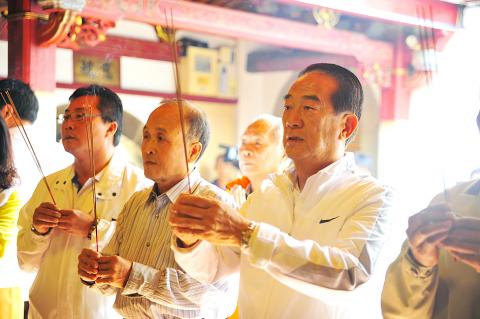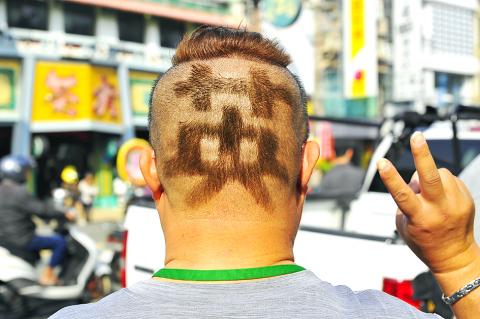The three presidential candidates’ campaigns converged in Tainan yesterday — “Super Sunday,” the last weekend day of the campaign before Saturday’s elections — where they took part in motorcades, rallies and campaign events in bids to woo southern voters.
Chinese Nationalist Party (KMT) presidential candidate Eric Chu (朱立倫) yesterday morning toured the city, a traditional pan-green stronghold, in a motorcade from Yongkang District (永康) before an evening rally in Anping District (安平).
Democratic Progressive Party (DPP) presidential candidate Tsai Ing-wen (蔡英文) began her campaign events by visiting the Kaitai Tianhou Temple (天后宮) in Anping District in the morning.

Photo: Sam Yeh, AFP
Her motorcade then toured the city, traveled to Chiayi for another street procession and then returned to Tainan for a nighttime rally.
The campaign trail of People First Party presidential candidate James Soong (宋楚瑜) saw him arrive in Tainan at about noon, where he visited Chenghuang Temple (城隍廟) before traveling to Kaohsiung, where he attended a rally and led a motorcade through the municipality.
The Tainan Police Department said Chu and Tsai’s motorcade routes through the city were plotted to avoid each other.

Photo: Tsai Wen-chu, Taipei Times
A total of 890 police officers were deployed to enhance safety and prevent traffic congestion, the department said.
It had not issued orders to cancel police vacations, while individual precincts were responsible for their duty rosters, the department said.
Citing public safety concerns, the police department, prior to the candidates’ arrival in Tainan, called on the public to refrain from lighting firecrackers, jaywalking or rushing toward motorcades.

Photo: Wang Chieh, Taipei Times
Tainan Mayor William Lai (賴清德) said that Super Sunday this year was “especially ‘super’ for Tainan, as it was the first time that Chu, Tsai and Soong — as presidential candidates — had been in the city on the same day.”
The candidates’ routes had been studied by a city government task force ahead of time to avoid them running into each other, Lai said.
Things that were planned ahead of time included finding out where street processions would overlap and scheduling convoys to pass those intersections at different times, he said.

Photo: Wang Chieh, Taipei Times
“Everyone is a welcomed guest in Tainan and the city government has the duty to ensure the safety of every candidate,” said Lai, who is a member of the DPP.

NATIONAL SECURITY THREAT: An official said that Guan Guan’s comments had gone beyond the threshold of free speech, as she advocated for the destruction of the ROC China-born media influencer Guan Guan’s (關關) residency permit has been revoked for repeatedly posting pro-China content that threatens national security, the National Immigration Agency said yesterday. Guan Guan has said many controversial things in her videos posted to Douyin (抖音), including “the red flag will soon be painted all over Taiwan” and “Taiwan is an inseparable part of China,” while expressing hope for expedited “reunification.” The agency received multiple reports alleging that Guan Guan had advocated for armed reunification last year. After investigating, the agency last month issued a notice requiring her to appear and account for her actions. Guan Guan appeared as required,

Japan and the Philippines yesterday signed a defense pact that would allow the tax-free provision of ammunition, fuel, food and other necessities when their forces stage joint training to boost deterrence against China’s growing aggression in the region and to bolster their preparation for natural disasters. Japan has faced increasing political, trade and security tensions with China, which was angered by Japanese Prime Minister Sanae Takaichi’s remark that a Chinese attack on Taiwan would be a survival-threatening situation for Japan, triggering a military response. Japan and the Philippines have also had separate territorial conflicts with Beijing in the East and South China

A strong cold air mass is expected to arrive tonight, bringing a change in weather and a drop in temperature, the Central Weather Administration (CWA) said. The coldest time would be early on Thursday morning, with temperatures in some areas dipping as low as 8°C, it said. Daytime highs yesterday were 22°C to 24°C in northern and eastern Taiwan, and about 25°C to 28°C in the central and southern regions, it said. However, nighttime lows would dip to about 15°C to 16°C in central and northern Taiwan as well as the northeast, and 17°C to 19°C elsewhere, it said. Tropical Storm Nokaen, currently

PAPERS, PLEASE: The gang exploited the high value of the passports, selling them at inflated prices to Chinese buyers, who would treat them as ‘invisibility cloaks’ The Yilan District Court has handed four members of a syndicate prison terms ranging from one year and two months to two years and two months for their involvement in a scheme to purchase Taiwanese passports and resell them abroad at a massive markup. A Chinese human smuggling syndicate purchased Taiwanese passports through local criminal networks, exploiting the passports’ visa-free travel privileges to turn a profit of more than 20 times the original price, the court said. Such criminal organizations enable people to impersonate Taiwanese when entering and exiting Taiwan and other countries, undermining social order and the credibility of the nation’s